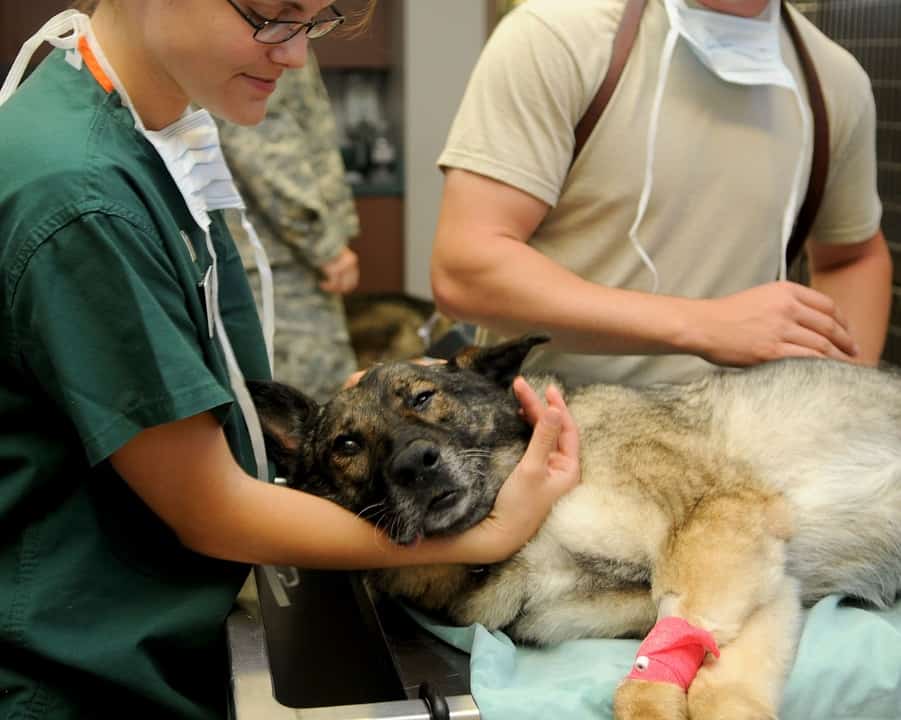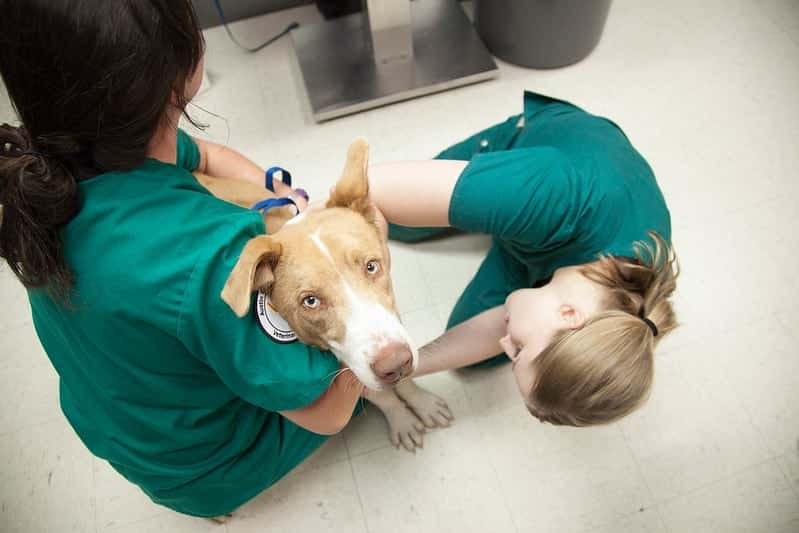Along with providing a loving home, playtime, and kibble for our pets, we also need to provide veterinary care. Usually, our first contact in a veterinary clinic is with a Veterinary Technician, but have we ever really considered what it takes to be a veterinary technician? Here, we will give you an idea of just what it takes to be one.
Veterinary Technician Job Description
A veterinary technician is the “nurse” that assists veterinarians with the treatment of our pets. It is not just our pets they work with. A veterinary technician can also work in zoos, research facilities, animal shelters, and rescue agencies. They are the veterinarian’s right-hand person. They follow the instructions that they are given to help provide care for each pet.
Veterinary Technician Job Duties
Veterinary technicians have an array of different duties depending on where they work. Some of their duties are:
- Doing X-rays
- Collecting samples (blood, fecal, and urine)
- Sterilizing equipment used for surgery and dental procedures
- Helping prepare animals for surgery and dental procedures
- Helping with controlling animals during treatment
- Giving shots and medications
- Assisting with research processes
- Feeding and bathing injured animals
- Providing pet parents/attendants with information
- Providing information on different products that will help with pet/animal wellness
- Keeping records of pets/animals and billing information
Requirements To Become A Veterinary Technician
image source: flickr.com
In order to work as a veterinary technician, one needs at least an associate’s degree in veterinary technology. A bachelor’s degree is also something many people complete. Regardless of either degree, it should be obtained through an institution that is approved by the American Veterinary Medical Association (AVMA).
Here in the United States, we have 217 veterinary programs available. For an associate degree, schooling lasts about 2 years. For a bachelor’s degree, training can last up to 4 years. The courses you take will provide you with the knowledge needed to become a veterinary technician. Most colleges also require that you participate in internships and externships. This gives you the opportunity to get hands-on experience working with a wide range of animals.
General Courses For Veterinarian Technician
- Proper training in medications
- Learning chemical process as relates to animals
- Diagnosing diseases by examining animal tissues and bodily fluids
- Learning how to provide nursing care for injured animals
- Learning the structure and process of animals
- Studying different diseases that affect animals
- Learning how to administer anesthesia to animals
- Learning how to assist during surgery
- Learning process used for clinical and lab studies
Those who are interested in applying their knowledge to a research center can also receive a certification through the American Association for Laboratory Animal Science (AALAS). This documentation is optional.
AALAS Certification
- LATG: Laboratory Animal Technologist
- LAT: Laboratory Animal Technologist
- ALAT: Assistant Laboratory Animal Technician
Each state regulates veterinary technicians in different ways, but most are required to take credentialing exams – usually the Veterinary Technician National Exam (VTNE). This exam is exclusively prepared by the American Association of Veterinary State Boards (AAVSB). The exam is offered during certain times of the year.
The VTNE consists of 200 multiple-choice questions and can take approximately 4 hours to complete. The exam covers 7 major areas that all entry-level candidates must be proficient in.
7 Areas Of Knowledge
- How to properly give anesthesia to animals
- How to perform dentistry procedures
- Nursing injured animals back to health
- Knowledge of different medications used for animals
- Knowledge of performing x-rays, ultrasounds, and other radioactive procedures
- Knowledge of preparing surgical instruments and assisting during surgery
- How to complete lab procedures
Practice exams can be bought on the AAVSB website. Always consult your state’s board of health for any special requirements that may be required.
As with most industries, technology is always changing, and it is no different with veterinary services. Look for opportunities to continue your education. It will provide you with more experience and extra hands-on experience. Many continued education opportunities can give you hands-on experience working with animals you are not familiar with or have never worked with. These opportunities can be very beneficial when an unexpected animal is brought into your place of work.
Additional Considerations
image source: pixabay.com
Being a veterinary technician requires more than gaining the degree and passing state boards. You won’t just be working with animals; you will also be working with pet parents as well as other animal attendants. You receive so much training on working with animals, but there isn’t much training when it comes to communication with different people. You will need to develop the ability to communicate in a way that people can understand what is required for caring or providing for their pets and the costs.
Helping animals is the major task of veterinary technicians. What some people haven’t considered is that there will be times that nothing can be done to help an animal and that putting it to sleep is the best option. Losing a pet is usually as hard on pet parents/attendants as it is to lose a human loved one.
Not all animals are going to be easy to work with. More times than not, you will be working with animals that are terrified. You may need another set of hands to work with them, or you may have to consider sedation to accomplish the task. Keeping that in mind, you can expect scratches, bites, and aggressive animals.
You also need to consider what types of animals you will be working with. You may be working with more than cats and dogs. You may be in a clinic that also works with big animals like horses and cows. Also, nowadays, many people have exotic pets; many of which have their own special requirements for care.
One of the things that will make you a better veterinary technician is being a pet parent yourself. This provides you with insider knowledge. You will be able to be more empathetic and understanding towards what pet parents are going through. With that being said, you may find it hard to separate your personal life from your professional life. Remember, you need to give yourself a break from work and enjoy some personal time.
Another reality is that there are going to be times when a pet parent may not be able to or want to do everything that is needed for their pet. Many people have budgets that don’t always allow for paying a vet bill something happens to their pet. It is heartbreaking for the pet parents, many of whom see their pets as members of the family. Sometimes the best thing you can provide for them is options.
There are going to be times when you will have to deal with pet parents that are not happy with your advice or refuse to listen to what you have to say, especially if the advice you are giving is on a touchy subject like obesity. It can be difficult to get a pet parent to understand that they are part of the problem and that their actions are what determines the outcome of their pet’s health.
One of the biggest things you have to take into consideration is the long hours and exhaustion. You may not work a 40-hour work week. You may need to work on Saturdays. There are many places that are open 24/7. Extra hours may be necessary if there’s an issue with understaffing. Sometimes it is not the hours that make for a long day but dealing with multiple stressful situations.
They may come at you one at a time or all at the same time. With these situations, you need to be able to work through each situation without losing your cool or becoming an emotional wreck. Learn coping skills to help you with stress. Ask co-workers for ideas that may be helpful for you to de-stress.
You also need to consider the fact that there are going to be times when having patience will be your most important skill. Difficult pets or pet parents can cause a lot of frustration and sometimes you are going to need to step back and take a breather in order to refocus on the issue at hand.
Working as a veterinary technician, you need to have respect in order to receive it. Respect the person by listening to what they are telling you. If you are unsure of what they are saying, ask questions that may help you better understand the situation. Also, remember that you may be dealing with someone who is upset about why they are there in the first place.
Conclusion
image source: flickr.com
Becoming a veterinary technician can be a very satisfying profession, especially if you have a love for animals. It is important that you do your homework and research before considering becoming a veterinarian technician. It can be expensive and requires that you be willing to go to school for 2 to 4 years depending on whether you obtain your associate or bachelor’s degree. But, once you have successfully helped provide medical care for your first animal, you will know that all the effort you put into your degree was well worth the time and money spent.




